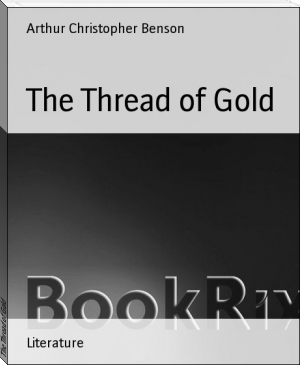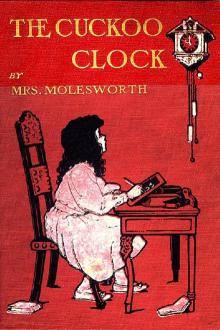The Thread of Gold, Arthur Christopher Benson [free ebook reader for pc .TXT] 📗

- Author: Arthur Christopher Benson
Book online «The Thread of Gold, Arthur Christopher Benson [free ebook reader for pc .TXT] 📗». Author Arthur Christopher Benson
He seemed loath to leave me. But what word or gift, I thought, did he bring with him, false and pretty bird? Do I too desire that others should hatch my eggs, content with flute-like notes of pleasure?
And yet how strange and marvellous a thing this instinct is; that one bird, by an absolute and unvarying instinct, should forego the dear business of nesting and feeding, and should take shrewd advantage of the labours of other birds! It cannot be a deliberately reasoned or calculated thing; at least we say that it cannot; and yet not Darwin and all his followers have brought us any nearer to the method by which such an instinct is developed and trained, till it has become an absolute law of the tribe; making it as natural a thing for the cuckoo to search for a built nest, and to cast away its foundling egg there, as it is for other birds to welcome and feed the intruder. It seems so satanically clever a thing to do; such a strange fantastic whim of the Creator to take thought in originating it! It is this whimsicality, the bizarre humour in Nature, that puzzles me more than anything in the world, because it seems like the sport of a child with odd inconsequent fancies, and with omnipotence behind it all the time. It seems strange enough to think of the laws that govern the breeding, nesting, and nurture of birds at all, especially when one considers all the accidents that so often make the toil futile, like the stealing of eggs by other birds, and the predatory incursions of foes. One would expect a law, framed by omnipotence, to be invariable, not hampered by all kinds of difficulties that omnipotence, one might have thought, could have provided against. And then comes this further strange variation in the law, in the case of this single family of birds, and the mystery thickens and deepens. And stranger than all is the existence of the questioning and unsatisfied human spirit, that observes these things and classifies them, and that yet gets no nearer to the solution of the huge, fantastic, patient plan! To make a law, as the Creator seems to have done; and then to make a hundred other laws that seem to make the first law inoperative; to play this gigantic game century after century; and then to put into the hearts of our inquisitive race the desire to discover what it is all about; and to leave the desire unsatisfied. What a labyrinthine mystery! Depth beyond depth, and circle beyond circle!
It is a dark and bewildering region that thus opens to the view. But one conclusion is to beware of seeming certainties, to keep the windows of the mind open to the light; not to be over-anxious about the little part we have to play in the great pageant, but to advance, step by step, in utter trustfulness.
Perhaps that is your message to me, graceful bird, with the rich joyful note! With what a thrill, too, do you bring back to me the brightness of old forgotten springs, the childish rapture at the sweet tunable cry! Then, in those far-off days, it was but the herald of the glowing summer days, the time of play and flowers and scents. But now the soft note, it seems, opens a door into the formless and uneasy world of speculation, of questions that have no answer, convincing me of ignorance and doubt, bidding me beat in vain against the bars that hem me in. Why should I crave thus for certainty, for strength? Answer me, happy bird! Nay, you guard your secret. Softer and more distant sound the sweet notes, warning me to rest and believe, telling me to wait and hope.
But one further thought! One is expected, by people of conventional and orthodox minds, to base one's conceptions of God on the writings of frail and fallible men, and to accept their slender and eager testimony to the occurrence of abnormal events as the best revelation of God that the world contains. And all the while we disregard his own patient writing upon the wall. Every day and every hour we are confronted with strange marvels, which we dismiss from our minds because, God forgive us, we call them natural; and yet they take us back, by a ladder of immeasurable antiquity, to ages before man had emerged from a savage state. Centuries before our rude forefathers had learned even to scratch a few hillocks into earthworks, while they lived a brutish life, herding in dens and caves, the cuckoo, with her traditions faultlessly defined, was paying her annual visits, fluting about the forest glades, and searching for nests into which to intrude her speckled egg. The patient witness of God! She is as direct a revelation of the Creator's mind, could we but interpret the mystery of her instincts, as Augustine himself with his scheme of salvation logically defined. Each of these missions, whether of bird or man, a wonder and a marvel! But do we not tend to accept the eager and childish hopes of humanity, arrayed with blithe certainty, as a nearer evidence of the mind of God than the bird that at his bidding pursues her annual quest, unaffected by our hasty conclusions, unmoved by our glorified visions? I have sometimes thought that Christ probably spoke more than is recorded about the observation of Nature; the hearts of those that heard him were so set on temporal ends and human applications, that they had not perhaps leisure or capacity to recollect aught but those few scattered words, that seem to speak of a deep love for and insight into the things of earth. They remembered better that Christ blasted a fig-tree for doing what the Father bade the poor plant do, than his tender dwelling upon grasses and lilies, sparrow and sheep. The withering of the tree made an allegory: while the love of flowers and streams was to those simple hearts perhaps an unaccountable, almost an eccentric thing. But had Christ drawn human breath in our bleaker Northern air, he would have perhaps, if those that surrounded him had had leisure and grace to listen, drawn as grave and comforting a soul-music from our homely cuckoo, with her punctual obedience, her unquestioning faith, as he did from the birds and flowers of the hot hillsides, the pastoral valleys of Palestine. I am sure he would have loved the cuckoo, and forgiven her her heartless customs. Those that sing so delicately would not have leisure and courage to make their music so soft and sweet, if they had not a hard heart to turn to the sorrows of the world.
Yet still I am no nearer the secret. God sends me, here the frozen peak, there the blue sea; here the tiger, there the cuckoo; here Virgil, there Jeremiah; here St Francis of Assisi, there Napoleon. And all the while, as he pushes his fair or hurtful toys upon the stage, not a whisper, not a smile, not a glance escapes him; he thrusts them on, he lays them by; but the interpretation he leaves with us, and there is never a word out of the silence to show us whether we have guessed aright.
VIII
Spring-time
Yesterday was a day of brisk airs. The wind was at work brushing great inky clouds out of the sky. They came sailing up, those great rounded masses of dark vapour, like huge galleons driving to the West, spilling their freight as they came. The air would be suddenly full of tall twisted rain-streaks, and then would come a bright burst of the sun.
But a secret change came in the night; some silent power filled the air with warmth and balm. And to-day, when I walked out of the town with an old and familiar friend, the spring had come. A maple had broken into bloom and leaf; a chestnut was unfolding his gummy buds; the cottage gardens were full of squills and hepatica; and the mezereons were all thick with damask buds. In green and sheltered underwoods there were bursts of daffodils; hedges were pricked with green points; and a delicate green tapestry was beginning to weave itself over the roadside ditches.
The air seemed full of a deep content. Birds fluted softly, and the high elms which stirred in the wandering breezes were all thick with their red buds. There was so much to look at and to point out that we talked but fitfully; and there was, too, a gentle languor abroad which made us content to be silent.
In one village which we passed, a music-loving squire had made a concert for his friends and neighbours, and doubtless, too, for our vagrant delight; we stood uninvited to listen to a tuneful stir of violins, which with a violoncello booming beneath, broke out very pleasantly from the windows of a village school-room.
When body and mind are fresh and vigorous, these outside impressions often lose, I think, their sharp savours. One is preoccupied with one's own happy schemes and merry visions; the bird sings shrill within its cage, and claps its golden wings. But on such soft and languorous days as these days of early spring, when the body is unstrung, and the bonds and ties that fasten the soul to its prison are loosened and unbound, the spirit, striving to be glad, draws in through the passages of sense these swift impressions of beauty, as a thirsty child drains a cup of spring-water on a sun-scorched day, lingering over the limpid freshness of the gliding element. The airy voices of the strings being stilled, with a sort of pity for those penned in the crowded room, interchanging the worn coinage of civility, we stood a while looking in at a gate, through which we could see the cool front of a Georgian manor-house, built of dusky bricks, with coigns and dressings of grey stone. The dark windows with their thick white casements, the round-topped dormers, the steps up to the door, and a prim circle of grass which seemed to lie like a carpet on the pale gravel, gave the feeling of a picture; the whole being framed in the sombre yews of shrubberies which bordered the drive. It was hard to feel that the quiet house was the scene of a real and active life; it seemed so full of a slumberous peace, and to be tenanted only by soft shadows of the past. And so we went slowly on by the huge white-boarded mill, its cracks streaming with congealed dust of wheat, where the water thundered through the sluices and the gear rattled within.
We crossed the bridge, and walked on by a field-track that skirted the edge of the wold. How thin and clean were the tints of the dry ploughlands and the long sweep of pasture! Presently we were at the foot of a green drift-road, an old Roman highway that ran straight up into the downs. On such a day





Comments (0)